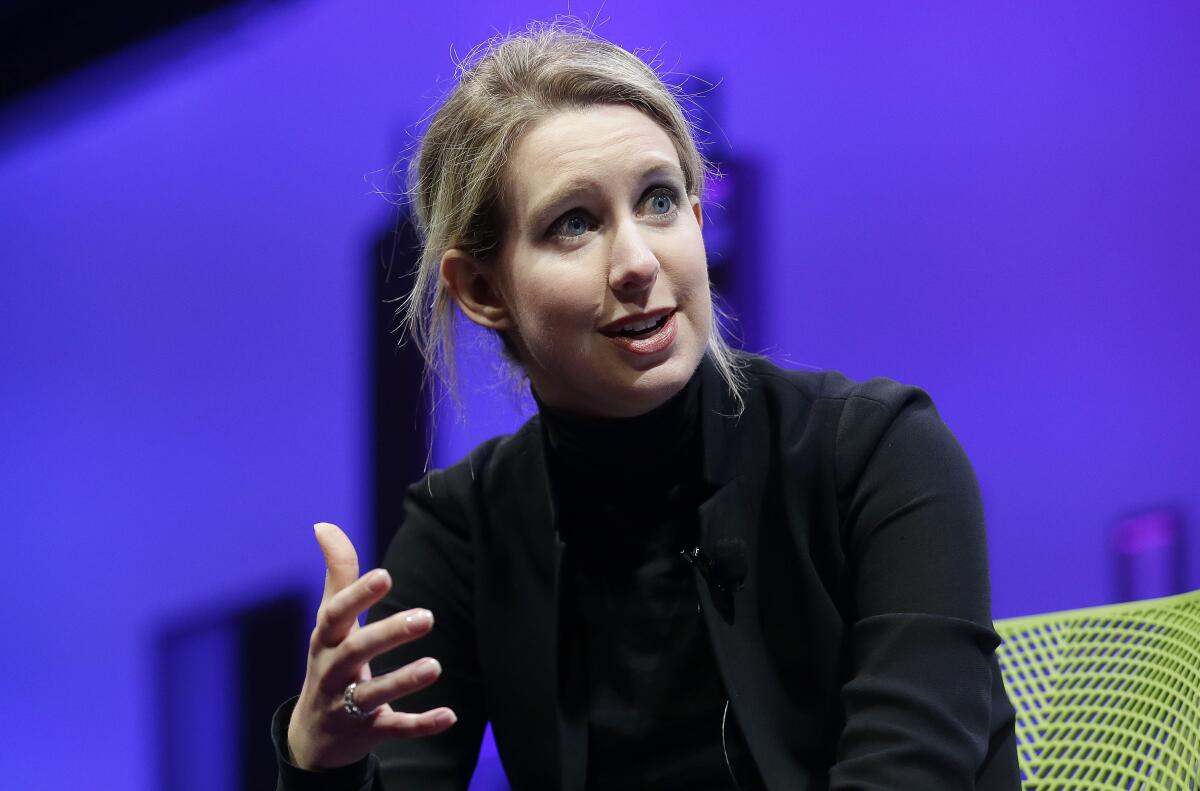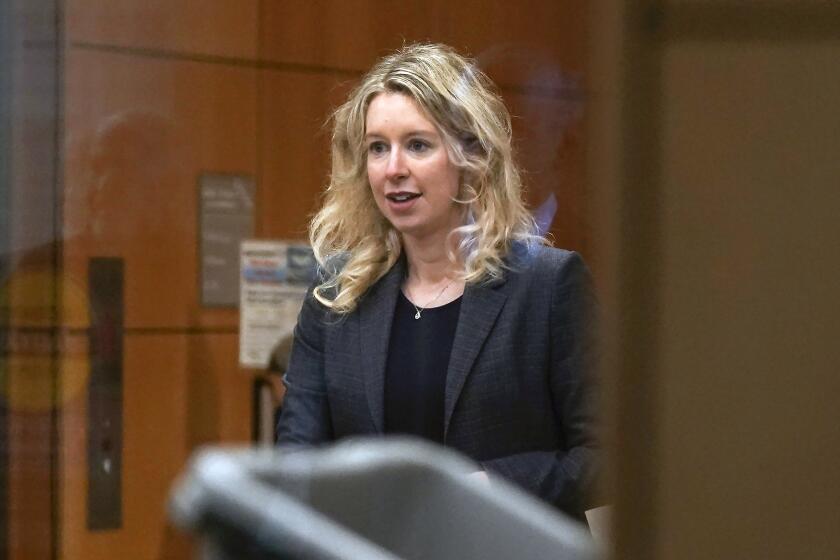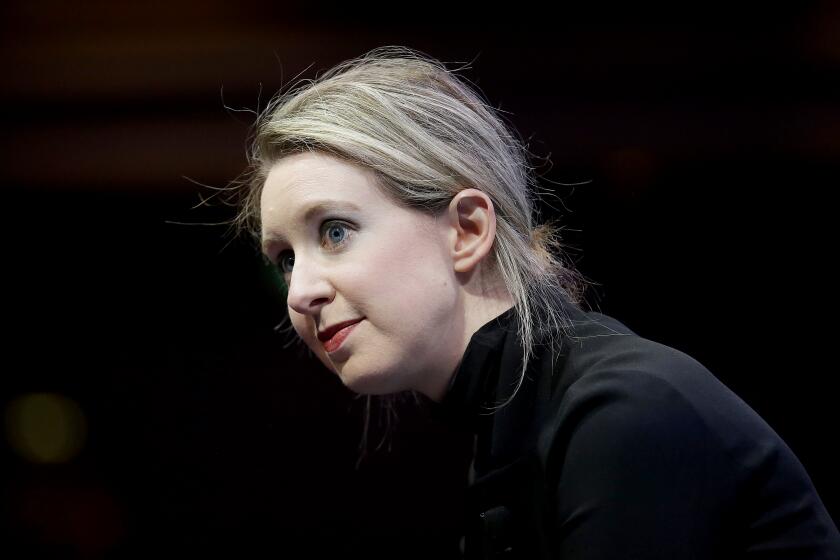Elizabeth Holmes enters Texas prison to begin serving her 11-year sentence

- Share via
BRYAN, Texas — Theranos founder Elizabeth Holmes on Tuesday entered a Texas prison to begin serving an 11-year sentence for overseeing a blood-testing hoax that became a parable about greed and hubris in Silicon Valley.
Holmes, 39, could be seen from outside the prison’s gates walking into the federal women’s prison camp in Bryan, Texas, wearing jeans and a brown sweater and smiling as she spoke with two prison employees accompanying her.
The minimum-security facility — where the federal judge who sentenced Holmes in November recommended she be incarcerated — is about 95 miles northwest of Houston, where Holmes grew up aspiring to become a technology visionary along the lines of Apple co-founder Steve Jobs.
Holmes is leaving behind two young children: a son born in July 2021, a few weeks before the start of her trial, and a 3-month-old daughter, who was conceived after a jury convicted her of four felony counts of fraud and conspiracy in January 2022.
She was free on bail up until Tuesday, most recently living in the San Diego area with the children’s father, William “Billy” Evans. The couple met in 2017 around the time Holmes was under investigation for the collapse of Theranos, a startup she founded in 2003 after dropping out of Stanford when she was just 19.
While she was building Theranos, Holmes grew close to Ramesh “Sunny” Balwani, who would become her romantic partner as well as an investor and fellow executive in the Palo Alto company.
Holmes and Balwani promised that Theranos would revolutionize healthcare with a technology that could quickly scan for diseases and other problems with a few drops of blood taken with a finger prick.
Disgraced Theranos chief Elizabeth Holmes appears to be bound for prison soon after an appeals court rejected her bid to remain free while she tries to overturn her conviction in a blood-testing hoax.
The hype surrounding that purported breakthrough helped Theranos raise nearly $1 billion from enthralled investors and assemble an influential board of directors that included former Cabinet members George Shultz, Henry Kissinger and James Mattis. It also turned Holmes into a Silicon Valley sensation, with a fortune valued at $4.5 billion, at least on paper, in 2014.
But it all blew up after dangerous flaws in Theranos’ technology were exposed in a series of articles in the Wall Street Journal that Holmes and Balwani tried to thwart. Holmes and Balwani, who had been secretly living together while running Theranos, broke up after the newspaper’s revelations, and the company collapsed. In 2018, the U.S. Justice Department charged both with a lengthy list of white-collar crimes in a case aimed at putting a stop to the Silicon Valley practice of overselling the capabilities of a still-developing technology — a technique that became known as “fake it till you make it.”
During seven days of testimony on the witness stand, Holmes admitted making mistakes at Theranos but denied committing crimes. At one point, she told the jury that she had been sexually and emotionally abused by Balwani and that he controlled her in ways that she said clouded her thinking. Balwani’s attorney denied Holmes’ allegations, and that was one of the key reasons they were tried separately.
Walgreens Boots Alliance reached a tentative settlement with consumers who claimed that the drugstore giant was “willfully blind” to fraud at blood-testing startup Theranos.
Balwani, 57, was convicted of 12 felony counts of fraud and conspiracy in a trial that began two months after Holmes’ ended. He is serving a nearly 13-year sentence in a Southern California prison.
Maintaining that she was treated unfairly during the trial, Holmes sought to remain free during her appeal of her conviction. But that bid was rejected by U.S. District Judge Edward Davila, who presided over her trial, and the U.S. 9th Circuit Court of Appeals.
Attorneys representing Holmes did not immediately respond when contacted by the Associated Press for a statement Tuesday.
The federal prison camp in Bryan encompasses about 37 acres and houses about 650 women — including “Real Housewives of Salt Lake City” star Jen Shah, who was sentenced this year to 6½ years in prison for defrauding thousands of people in a years-long telemarketing scam.
Most federal prison camps don’t even have fences and house those the Bureau of Prisons considers to be the lowest security risk. The prison camps also often have minimal staffing, and many of the people incarcerated there work in prison jobs.
Blood-testing start-up Theranos Inc. has been dealt a major blow: Federal regulators banned founder and Chief Executive Elizabeth Holmes from owning or running a medical laboratory for two years.
According to a 2016 inmate handbook, prisoners in the Texas facility can earn 12 cents to $1.15 an hour in food service, factory and other jobs offered by Federal Prison Industries.
Federal prison camps were designed with low security to make operations easier and to allow inmates tasked with performing work such as landscaping and maintenance to avoid having to check in and out of a main prison facility repeatedly. But the lax security has opened a gateway for contraband items, such as drugs, cellphones and weapons. It has also led to a number of escapes.
In November, a man incarcerated at a federal prison camp in Arizona pulled out a smuggled gun in a visitation area and tried to shoot his wife in the head. The gun jammed, and no one was injured. But the incident exposed major security flaws at the facility, and the director of the Bureau of Prisons ordered a review at all federal prison camps.
More to Read
Inside the business of entertainment
The Wide Shot brings you news, analysis and insights on everything from streaming wars to production — and what it all means for the future.
You may occasionally receive promotional content from the Los Angeles Times.













